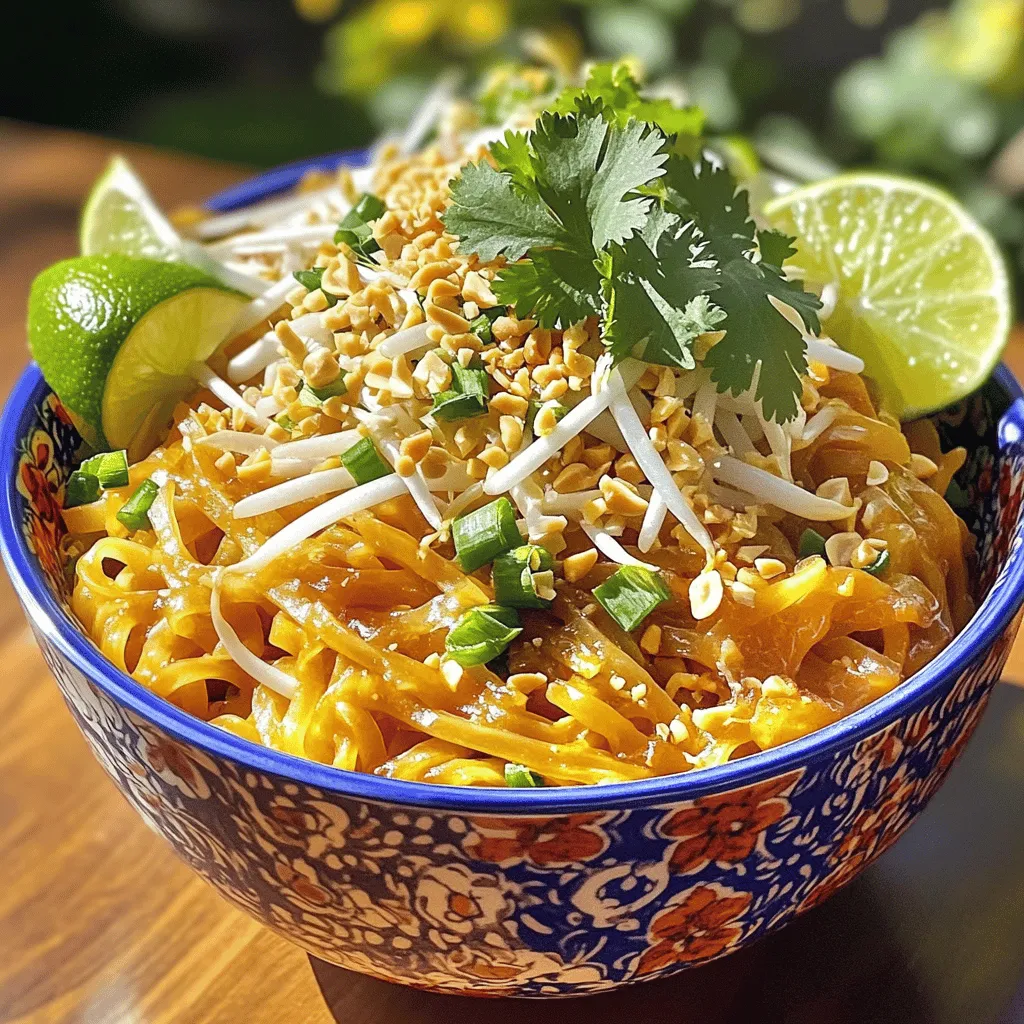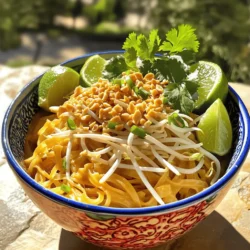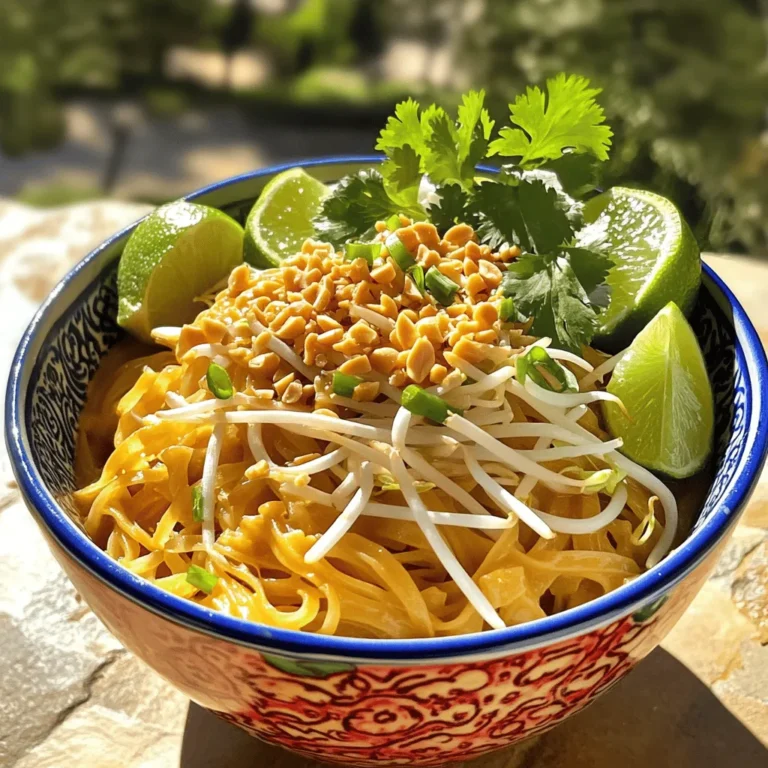Craving Pad Thai but short on time? You’re in luck! In just twenty minutes, you can whip up a quick and tasty meal that satisfies your hunger. I’ll guide you through each step, from essential ingredients to storage tips. Whether you’re a novice in the kitchen or a seasoned pro, this easy recipe guarantees authentic flavors. Let’s cook delicious Pad Thai together and impress everyone at the table!
Ingredients
Essential Ingredients for Pad Thai
To make a great Pad Thai, you need some key ingredients. Here’s a list that you’ll need:
- 8 oz rice noodles
- 2 tablespoons vegetable oil
- 2 cloves garlic, minced
- 1 cup chicken breast, thinly sliced (or tofu for vegetarian option)
- 2 eggs, beaten
- 1 cup bean sprouts
- 1/2 cup green onions, chopped
- 1/4 cup roasted peanuts, crushed
- 2 tablespoons soy sauce
- 1 tablespoon fish sauce (or a splash of soy sauce for vegetarian)
- 1 tablespoon tamarind paste
- Fresh cilantro and lime wedges for garnish
These ingredients come together to create a delicious meal that is quick and easy. The rice noodles give you that perfect chewy texture. The chicken or tofu adds protein and flavor. Garlic adds a lovely aroma, while the bean sprouts and green onions give it a fresh crunch.
Suggested Alternatives for Dietary Preferences
If you have dietary preferences, don’t worry! You can easily switch out some ingredients:
- Protein: Use tofu or shrimp instead of chicken.
- Sauces: For a vegetarian version, skip the fish sauce. Use more soy sauce.
- Noodles: If you want gluten-free, try rice noodles or zucchini noodles.
These swaps help you enjoy Pad Thai no matter your diet. You still get all the great flavors while meeting your needs.
Recommended Toppings for Enhanced Flavor
Toppings can take your Pad Thai to the next level. Here are some tasty options:
- Crushed peanuts for extra crunch
- Fresh cilantro for a burst of freshness
- Lime wedges for a zesty kick
- Chili flakes for a spicy touch
These toppings add flavor and make your dish look fantastic. A little crunch, some freshness, and a splash of lime make all the difference. Enjoy your Pad Thai with these fun additions!
Step-by-Step Instructions
Cooking the Rice Noodles
To start, bring a large pot of water to a boil. Once the water is bubbling, add 8 oz of rice noodles. Cook them for about 3-4 minutes until they are al dente. Al dente means they should be firm but not hard. Drain the noodles and set them aside. This step is key for a great texture in Pad Thai.
Sautéing the Aromatics and Protein
Now, grab a large skillet or wok and heat 2 tablespoons of vegetable oil over medium-high heat. Add 2 minced garlic cloves. Sauté the garlic for about 30 seconds until it smells great. Next, add 1 cup of thinly sliced chicken breast or tofu if you prefer. Cook the protein for 4-5 minutes until it is done. Once cooked, push the meat to one side of the pan. This makes space for the next step.
Combining Ingredients for Flavorful Pad Thai
Pour 2 beaten eggs into the clear side of the skillet. Scramble the eggs until they are fully cooked, then mix them with the chicken. After that, add the drained noodles to the skillet. Pour in 2 tablespoons of soy sauce, 1 tablespoon of fish sauce, and 1 tablespoon of tamarind paste. Toss everything well so the noodles soak up the flavors. Finally, fold in 1 cup of bean sprouts and 1/2 cup of chopped green onions. Cook for an extra 2 minutes until the veggies are slightly wilted. Serve your Pad Thai on a plate and top it with 1/4 cup of crushed peanuts, fresh cilantro, and lime wedges. Enjoy your quick and tasty meal!
Tips & Tricks
Time-Saving Hacks for Quick Cooking
To save time, gather all your ingredients first. Chop the garlic and green onions before you start. Soak the rice noodles in hot water while you prepare the other items. This cuts down on cooking time. Use a large skillet to cook everything in one go. This makes clean-up easier too.
How to Ensure Flavorful and Authentic Pad Thai
Use fresh ingredients for the best taste. Fresh garlic adds great flavor. Choose good-quality soy sauce and fish sauce for depth. Tamarind paste is key for that classic tang. Taste as you cook to adjust flavors. If it seems bland, add more soy or fish sauce.
Common Mistakes to Avoid
Don’t overcook the noodles; they should be al dente. If they get mushy, your dish won’t be as good. Avoid using too much oil; it can make your dish greasy. Be careful with the tamarind paste; a little goes a long way. Lastly, don’t forget to garnish! Fresh cilantro and lime make it pop.

Variations
Vegetarian and Vegan Modifications
You can easily make Pad Thai vegetarian or vegan. Simply swap chicken for tofu. Tofu gives a great texture and absorbs flavors well. Use soy sauce instead of fish sauce. This change keeps the umami taste while making it plant-based. You can also add more veggies like bell peppers or zucchini for extra nutrients.
Using Different Proteins or Noodle Types
While chicken is classic, you can use shrimp, beef, or pork. Each protein adds a unique taste. If you want a gluten-free option, use rice noodles made from 100% rice. You can also try wider rice noodles or even zucchini noodles for a low-carb twist.
Creative Add-ins for Extra Texture and Flavor
Add-ins can make your Pad Thai pop! Try adding crushed peanuts, which give a nice crunch. You can also sprinkle sesame seeds for a nutty flavor. Fresh herbs like basil or mint can brighten the dish. For some heat, toss in sliced jalapeños or chili flakes. These extras make each bite exciting!
Storage Info
Best Practices for Storing Leftover Pad Thai
To store leftover Pad Thai, let it cool down first. Once cooled, place it in an airtight container. This helps keep it fresh. You can store it in the fridge for up to three days. Make sure to label it with the date. This way, you won’t forget about it!
Reheating Tips for Maintaining Flavor and Texture
When you reheat Pad Thai, you want to keep it tasty. The best method is to use a skillet. Heat the skillet on medium heat. Add a splash of water or oil to keep it moist. Stir the Pad Thai often to warm it evenly. This should take about 5 to 7 minutes. If you use a microwave, cover it with a damp paper towel. This helps prevent it from drying out.
Freezing Pad Thai: What You Need to Know
You can freeze Pad Thai for later use! First, cool it completely. Then, place it in a freezer-safe container or bag. Remove as much air as possible. This helps prevent freezer burn. Label the container with the date. You can freeze it for up to three months. To eat, thaw it in the fridge overnight, then reheat it as mentioned above. Enjoy your quick and tasty meal anytime!
FAQs
How long does it take to prepare Pad Thai?
It takes about 10 minutes to prep and 10 minutes to cook. So, you can enjoy a hot plate of Pad Thai in just 20 minutes. This quick meal is perfect for busy days.
Can I make Pad Thai without fish sauce?
Yes, you can skip the fish sauce. Use extra soy sauce instead. This still gives you nice flavor. If you want a little more depth, add some salt or a splash of vinegar.
What can I substitute for tamarind paste?
If you don’t have tamarind paste, mix lime juice with brown sugar. This combo brings a sweet and tangy taste similar to tamarind. You can also use lemon juice as a backup option.
Is it possible to make Pad Thai spicy?
Absolutely! Add chili flakes or fresh sliced chili to your Pad Thai. You can also use sriracha or chili sauce for more heat. Start with a little, then adjust to your taste.
How do I know when the noodles are cooked properly?
Check the package for cooking time, usually around 3-4 minutes. The noodles should be soft but still firm, or al dente. Drain them quickly and rinse under cold water to stop cooking.
In this post, we explored how to make the perfect Pad Thai, from choosing the right ingredients to cooking methods. I shared tips for dietary needs and offered ways to enhance flavor with toppings. We also looked at variations, storage tips, and common questions. Making authentic Pad Thai can be easy and fun. With practice, you can create a dish that pleases everyone. Now, gather your ingredients and get cooking! Enjoy your Pad Thai adventure!


